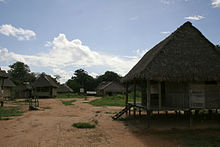The Ese Ejja are an indigenous people of Bolivia and Peru, in the southwestern Amazon basin. 1,687 Ese Ejja live in Bolivia, in the Pando and Beni Departments,[2] in the foothills along the Beni and the Madre de Dios Rivers. In Peru, they live along the Tambopata and Heath Rivers, near Puerto Maldonado.[1]
 Ese Ejja Village. Tambopata Rezerve, Peru | |
| Total population | |
|---|---|
| 2,100[1][2] | |
| Regions with significant populations | |
| Languages | |
| Ese Ejja • Spanish | |
| Religion | |
| Christianity[citation needed] • Traditional Tribal Religion[citation needed] |
Name
editTheir name derives from their autonym, Ece'je, which means "people."[citation needed] They are also known as the Chama, Ese Eja, Ese Exa, Ese’ejja, Huarayo, Tambopata-Guarayo, or Tiatinagua people.[1]
Language
editThe Ese Ejja language is a Tacanan language, spoken by all ages, and written in the Latin script. A dictionary has been produced for the language.[1]
Subsistence
editEse Ejja people are traditionally hunter-gatherers, farmers, rangers, and fishermen.[1]
Notes
edit- ^ a b c d e f "Ese Ejja." Ethnologue. Retrieved 17 Feb 2012.
- ^ a b c "Censo de Población y Vivienda 2012 Bolivia Características de la Población". Instituto Nacional de Estadística, República de Bolivia. p. 29. Archived from the original on 2021-08-01. Retrieved 2020-03-27.
External links
edit- Ese Ejja artwork Archived 2016-03-04 at the Wayback Machine, National Museum of the American Indian